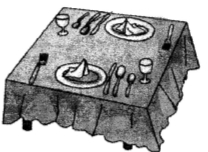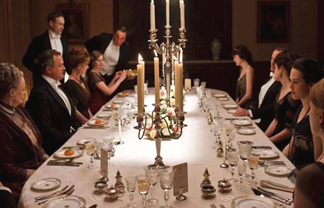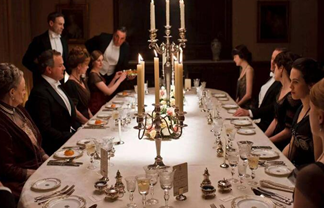-
Table manners are very different in every country. For example, when you are in England, you must not lift your soup plate to your mouth. This is very impolite. But when you are in Japan, this is completely normal. Lifting your plate to your mouth in Japan is a traditional way of drinking your soup. And also in Japan you don't have to worry about making a noise when you drink it. It just shows that you really like the food! But it is not the same in Britain, so you shouldn't make a noise when eating there.
In Britain, people don't put their hands or arms on the table during the meal. But in Mexico, guests keep their hands on the table all the time. In fact, you should watch what your hands do very carefully. In Arab countries, it is impolite when you eat with your left hand, so don't do it!
In all the cultures it is impolite to speak when you are eating.
In Ukraine you should not start eating first; you should wait for all the others to start eating with you. You also have to say “please” and “thank you” every time you ask for and get something. If you don't like some food, don't make faces and don't say: “Yuk! I hate that!”
The best way to avoid making mistakes in other countries is to watch the host and try to do as he does.
任务一:根据短文内容回答问题。
1.In which country can you lift your bowl to your mouth?
________________________________________________________________________
2.Is it polite to eat with your left hand in Arab countries?
________________________________________________________________________
3.What can't you say if you don't like some food in Ukraine?
________________________________________________________________________
任务二:按要求完成下列各题。
4.在文中找出与下面句子画线部分意思相近的单词。
Customs and habits are usually not_the_same in every country.
________________________________________________________________________
5.In the passage, the underlined word “it” refers to________________.
九年级英语多任务混合问题困难题查看答案及解析
-
American Table Manners
Table manners are different in different countries. What is polite in China may not be polite in the Unite States. These basic rules will help you enjoy western food with your American friends.
When you sit down at the table, always put the napkin on your lap first.
When eating something in a bowl, do not leave the spoon in the bowl. Put it on the plate under the bowl. When you have had your meal, place your knife and fork on the side of your plate.
During the meal, the hostess will offer you a second helping of food. Sometimes she will ask you to help yourself. When she offers you food, give her a direct answer. If you refuse the first time, she might not ask you again.
At the table, ask others to pass you dishes that are out of your reach. Good expressions to know are: “Please pass me the ...” or “Could you hand me the -please?”
The best way to learn good manners is to watch others. Observe (观察) the way your western friends eat. This is the best way to avoid making mistakes when you are unsure of what to do.

The Basic Rules of Table Manners in America
Before the meal
You should put the napkin on your 1. first.
During the meal
★ If the hostess offers you food, you' d better answer her 2. . She might ask you just once.
★ You can ask others for help when the dishes are 3. your reach.
After the meal
★ After you have the meal, you should put the 4. on the side of your plate.
The best way
★ If you don't know how to behave well at table, just 5. . It works well.
九年级英语其他题中等难度题查看答案及解析
-

Different countries have different ideas about how to be polite. In Britain, table manners are important. But how do you show good table manners in Britain? Here is some advice:
How to sit: You should sit up straight in your chair. When you eat, don’t pick up the bowl. This is called very bad manners.
Noises at the table: It is never a good idea to make a noise at the table.
Using your fingers: 62Usually we don’t pick food up with our fingers when we are eating main dishes. But there are some foods such as pizza, sandwiches, chips and fruit we can eat with fingers.
Passing things: If someone asks you to pass something like the salt, only get it if you are the closest person to it. Never lean (倾斜, 倾倒) across someone else’s food. It’s more polite not to use it yourself first --- pass it directly to the person who asked, and then use it later. It’s best to taste your food before you put salt in it.
Your mouth: 63 It is not polite to talk with your mouth full of food, nor to eat with your mouth open.
How much to eat: It is polite to eat up the food that you have been offered, so a clear plate is a good plate. It shows that you enjoy the food. If you can’t finish everything and you can leave a little, that is okay. You could say something like “That was very nice, thank you.”
(一)根据短文内容简要回答问题。
How should you sit when you eat in Britain?
1.
What shows that you like the food?
2.
(二)将短文中划线的句子译成汉语。
3.
4.
(三)请给短文拟一个适当的题目。
5.
九年级英语回答问题困难题查看答案及解析
-

Different countries have different ideas about how to be polite. In Britain, table manners are important. But how do you show good table manners in Britain? Here is some advice:
How to sit: You should sit up straight in your chair. When you eat, don’t pick up the bowl. This is called very bad manners.
Noises at the table: It is never a good idea to make a noise at the table.
Using your fingers: 62Usually we don’t pick food up with our fingers when we are eating main dishes. But there are some foods such as pizza, sandwiches, chips and fruit we can eat with fingers.
Passing things: If someone asks you to pass something like the salt, only get it if you are the closest person to it. Never lean (倾斜, 倾倒) across someone else’s food. It’s more polite not to use it yourself first --- pass it directly to the person who asked, and then use it later. It’s best to taste your food before you put salt in it.
Your mouth: 63 It is not polite to talk with your mouth full of food, nor to eat with your mouth open.
How much to eat: It is polite to eat up the food that you have been offered, so a clear plate is a good plate. It shows that you enjoy the food. If you can’t finish everything and you can leave a little, that is okay. You could say something like “That was very nice, thank you.”
(一)根据短文内容简要回答问题。
How should you sit when you eat in Britain?
1.
What shows that you like the food?
2.
(二)将短文中划线的句子译成汉语。
3.
4.
(三)请给短文拟一个适当的题目。
5.
九年级英语任务型阅读困难题查看答案及解析
-
任务型阅读 阅读下面的短文,根据短文内容完成表格中所缺信息,每空限填一词。
Manners are important in every country. But people have different ideas about their manners. What is good in one country may not be welcomed in another.
Chinese people are surprised to know the fact that an Englishman doesn’t stop to talk and shake hands with his friend in the street. They just say hello to each other and then pass on.
English people think that we Chinese end our visits to friends all of a sudden. They usually begin to show that they want to go 15 or 20 minutes before they leave their friend’s house. And they do this two or three times within 20 minutes.
Because of these differences, perhaps the most suitable advice for the overseas, no matter what country he is visiting, is to follow the old proverb: “When in Rome, do as the Romans do.”
Main idea
Some 1. between Chinese and English manners
Friends meeting in the street
Chinese stop to talk and shake hands. English people just 2. each other and pass on.
The habits of 3.
a visit
Chinese people leave all of a sudden while English people will leave 4. showing two or three times that they want to go.
Best advice
Follow the 5. customs
九年级英语其他题中等难度题查看答案及解析
-
After visiting different countries, I found _______ very important to learn about table manners.
A. it B. that C. this D. us
九年级英语单项填空困难题查看答案及解析
-
After visiting different countries, I found _______ very important to learn about table manners.
A. it B. that C. this D. us
九年级英语单选题中等难度题查看答案及解析
-
The table manners are different _________ ours.
A.of
B.for
C.from
D.with
九年级英语单项填空简单题查看答案及解析
-
Different countries have different ideas about manners-how you behave when you are eating.In England,table manners are important.Good table manners in England are as follows:
★How to sit:You should sit up straight in your chair.It is not a good idea to lean(倾斜)forwards or backwards.When you eat, you should not lean towards the plate,but bring the knife,fork or spoon towards you.At the same time,do not out your elbows on the table,nor reach over someone’s plate for something.
★Using your fingers:English people normally don’t pick food up with their fingers when they are eating main courses.If you are not sure,the safest is to use your knife or fork.There are,however,some foods that are usually eaten with fingers.They include sanwiches,burgers,crisps and fruit.
★Your mouth:It is not polite to talk with your mouth full of food,or to eat with your mouth open.And if possible,do not make any noises.Never lick(舔)your plate after eating.
★How much to eat:It is polite to eat the food that you have been offered,so a clear plate is a good plate.It shows that you enjoyed the food.If you can’t finish everything and need to leave a little,that’s also okay.You could say something like“That was very nice,thank you,but I’m just too full to eat another bite.”
1.How should you sit when you are eating in England?
A. You should lean backwards.
B. You should lean forwards.
C. You should sit up straight in your chair.
2.What food do Englishmen eat with their fingers?
A. Beef. B. Pizza. C. Juice.
3.What is the good table manners in England?
A. Reach over someone’s plate for something.
B. Lick your plate after eating.
C. Eat an orange with fingers.
4.What can we infer(推断)according to the passage?
A. Eating with the mouth closed is a good manner.
B. We mustn’t leave anything on the plate any time.
C. Saying sorry means we are full.
5.What does the passage mainly talk about?
A. The differences between England and China.
B. Good table manners in England.
C. The importance of table manners.
九年级英语阅读单选困难题查看答案及解析
-
Different countries have different ideas about manners-how you behave when you are eating.In England,table manners are important.Good table manners in England are as follows:
★How to sit:You should sit up straight in your chair.It is not a good idea to lean(倾斜)forwards or backwards.When you eat, you should not lean towards the plate,but bring the knife,fork or spoon towards you.At the same time,do not out your elbows on the table,nor reach over someone’s plate for something.
★Using your fingers:English people normally don’t pick food up with their fingers when they are eating main courses.If you are not sure,the safest is to use your knife or fork.There are,however,some foods that are usually eaten with fingers.They include sanwiches,burgers,crisps and fruit.
★Your mouth:It is not polite to talk with your mouth full of food,or to eat with your mouth open.And if possible,do not make any noises.Never lick(舔)your plate after eating.
★How much to eat:It is polite to eat the food that you have been offered,so a clear plate is a good plate.It shows that you enjoyed the food.If you can’t finish everything and need to leave a little,that’s also okay.You could say something like“That was very nice,thank you,but I’m just too full to eat another bite.”
1.How should you sit when you are eating in England?
A.You should lean backwards.
B.You should lean forwards.
C.You should sit up straight in your chair.
2.What food do Englishmen eat with their fingers?
A.Beef. B.Pizza. C.Juice.
3.What is the good table manners in England?
A.Reach over someone’s plate for something.
B.Lick your plate after eating.
C.Eat an orange with fingers.
4.What can we infer(推断)according to the passage?
A.Eating with the mouth closed is a good manner.
B.We mustn’t leave anything on the plate any time.
C.Saying sorry means we are full.
5.What does the passage mainly talk about?
A.The differences between England and China.
B.Good table manners in England.
C.The importance of table manners.
九年级英语阅读单选困难题查看答案及解析